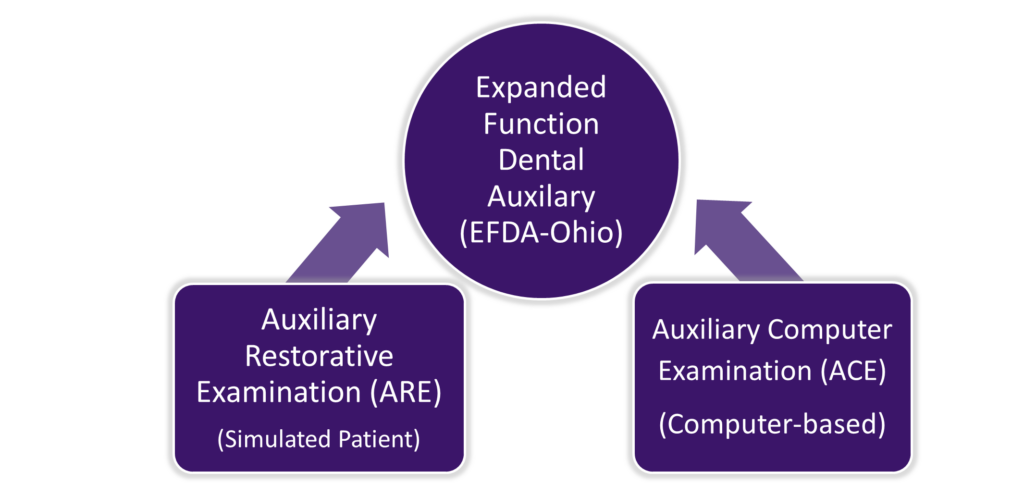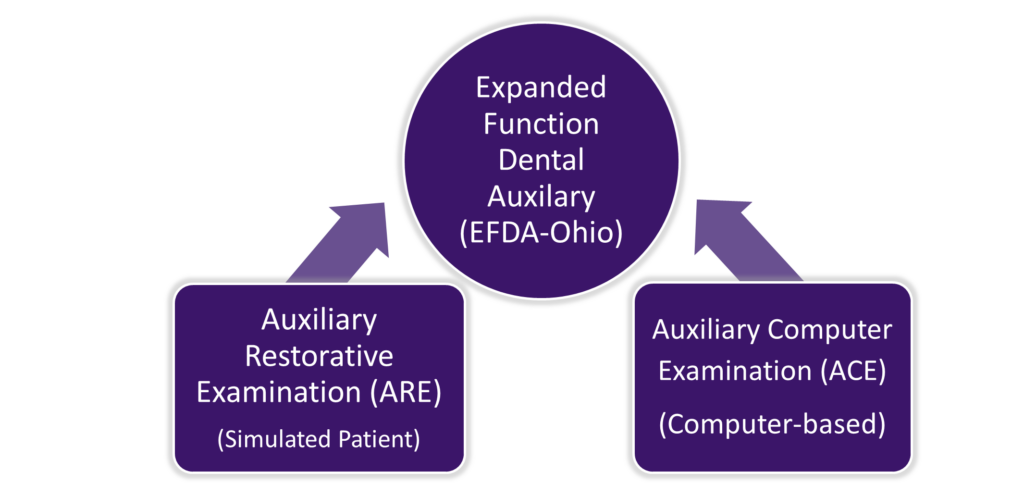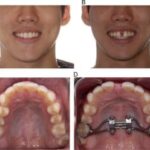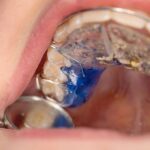https://upload.wikimedia.org/wikipedia/commons/c/ca/1×1.png
Are you interested in becoming a dental assistant? Have you heard about the expanded functions dental assistant certification? If you’re looking to take your dental assisting career to the next level, then this certification might be just what you need.
Expanded functions dental assistants (EFDAs) are highly skilled professionals who have completed additional training to perform advanced dental procedures. They work closely with dentists to provide quality care to patients. With an EFDA certification, you can expand your scope of practice and take on more responsibilities in the dental office.
During the EFDA certification program, you will learn a variety of skills, including placing and removing dental fillings, taking impressions, and performing certain dental procedures. This additional training will give you the knowledge and confidence to assist dentists in more complex procedures, making you an invaluable member of the dental team.
Not only does an EFDA certification allow you to perform advanced dental procedures, but it also opens up new career opportunities. Many dental offices prefer to hire EFDAs because they can handle a wider range of tasks, which means you’ll have a competitive edge in the job market. Whether you’re looking to work in a private practice, a dental clinic, or even a hospital, an EFDA certification will increase your chances of landing a rewarding job.
What is Expanded Functions Dental Assistant Certification?
Expanded Functions Dental Assistant (EFDA) Certification is a professional credential that allows dental assistants to perform advanced dental procedures under the supervision of a licensed dentist. EFDA certification enables dental assistants to take on additional responsibilities and provide a higher level of patient care.
The certification program provides dental assistants with the necessary knowledge and skills to perform tasks such as placing and removing dental fillings, taking dental impressions, applying dental sealants, and performing certain dental radiographic procedures. These expanded functions help to improve the efficiency and effectiveness of dental practices, as well as enhance the overall patient experience.
EFDA certification is recognized and regulated by state dental boards, which set the specific requirements and guidelines for obtaining and maintaining the certification. Dental assistants must meet certain educational and training requirements, pass written and practical exams, and fulfill continuing education requirements to maintain their certification.
By obtaining EFDA certification, dental assistants can expand their career opportunities and increase their earning potential. They can work in a variety of dental settings, including private dental offices, community health clinics, and specialty practices. EFDA-certified dental assistants are valued members of the dental team and play a crucial role in providing quality oral healthcare to patients.
| Benefits of Obtaining Expanded Functions Dental Assistant Certification |
|---|
| 1. Increased job opportunities |
| 2. Higher earning potential |
| 3. Expanded scope of practice |
| 4. Enhanced patient care |
| 5. Professional recognition |
Benefits of Obtaining Expanded Functions Dental Assistant Certification
Obtaining Expanded Functions Dental Assistant Certification offers numerous benefits for individuals looking to advance their careers in the dental field. Here are some of the key advantages:
1. Increased Job Opportunities:
With Expanded Functions Dental Assistant Certification, you become eligible for a wider range of job opportunities in dental offices and clinics. This certification demonstrates your advanced skills and knowledge, making you a valuable asset to potential employers.
2. Expanded Scope of Practice:
With this certification, you gain the ability to perform additional procedures and tasks beyond the traditional dental assisting role. This includes tasks such as placing and removing dental fillings, taking impressions, and applying dental sealants. The expanded scope of practice allows you to take on more responsibilities and contribute to the overall efficiency of the dental practice.
3. Enhanced Professionalism:
Obtaining Expanded Functions Dental Assistant Certification showcases your commitment to professional development and continuous learning. It demonstrates your dedication to providing high-quality patient care and staying up-to-date with the latest advancements in dental assisting techniques and procedures.
4. Increased Earning Potential:
With Expanded Functions Dental Assistant Certification, you may have the opportunity to earn a higher salary compared to non-certified dental assistants. The additional skills and responsibilities associated with this certification can make you a more valuable employee, leading to potential salary increases and better job prospects.
5. Personal Satisfaction:
By obtaining this certification, you can experience a sense of personal achievement and fulfillment. It validates your expertise and dedication to your profession, giving you confidence in your abilities as a dental assistant.
Requirements for Obtaining Expanded Functions Dental Assistant Certification
https://upload.wikimedia.org/wikipedia/commons/c/ca/1×1.png
To become a certified expanded functions dental assistant, there are certain requirements that need to be met. These requirements ensure that individuals have the necessary skills and knowledge to perform their duties effectively and safely. Here are the key requirements for obtaining expanded functions dental assistant certification:
Education and Training
To be eligible for certification, individuals must complete a dental assisting program accredited by the Commission on Dental Accreditation (CODA). These programs provide the necessary education and training in dental assisting techniques, dental materials, radiography, infection control, and other relevant topics.
Clinical Experience
In addition to completing an accredited dental assisting program, candidates must also gain practical experience in a dental office or clinic. Most states require a minimum number of hours of clinical experience, which can range from 500 to 1,000 hours. This hands-on experience allows individuals to apply their knowledge and skills in a real-world dental setting.
CPR Certification
CPR (Cardiopulmonary Resuscitation) certification is often a requirement for obtaining expanded functions dental assistant certification. This certification ensures that individuals are prepared to handle emergency situations and provide life-saving interventions if necessary.
State-Specific Requirements
Continuing Education
https://upload.wikimedia.org/wikipedia/commons/c/ca/1×1.png
Once certified, expanded functions dental assistants are typically required to complete continuing education courses to maintain their certification. These courses help dental assistants stay up-to-date with the latest advancements in dental technology, infection control protocols, and other relevant topics. Continuing education requirements vary by state and must be completed within a specified time frame.
Professionalism and Ethical Conduct
Dental assistants seeking certification must also demonstrate professionalism and ethical conduct in their work. This includes maintaining patient confidentiality, adhering to professional standards and guidelines, and treating patients with respect and empathy.
Training and Education for Expanded Functions Dental Assistant Certification
Training and education are essential for individuals seeking to obtain Expanded Functions Dental Assistant (EFDA) certification. EFDA certification allows dental assistants to perform advanced tasks and procedures under the supervision of a licensed dentist.
To become an EFDA, individuals must first complete a dental assisting program accredited by the Commission on Dental Accreditation (CODA). These programs typically take 9-12 months to complete and include both classroom instruction and hands-on clinical experience.
During the program, students learn about dental anatomy, oral health, infection control, dental materials, and dental radiography. They also receive training in chairside assisting, dental procedures, and patient management.
After completing the dental assisting program, individuals must pass the Dental Assisting National Board (DANB) exam to become a Certified Dental Assistant (CDA). This certification is a prerequisite for pursuing EFDA certification.
Once individuals have obtained their CDA certification, they can enroll in an EFDA program. These programs provide additional training in advanced dental procedures, such as placing dental sealants, taking impressions, and performing coronal polishing.
EFDA programs can vary in length, ranging from a few weeks to several months. They may be offered by community colleges, vocational schools, or dental schools. Some programs may also be available online, allowing individuals to complete the coursework at their own pace.
During the EFDA program, students receive hands-on training and practice under the supervision of experienced dental professionals. They learn how to perform expanded functions safely and effectively, ensuring the highest level of patient care.
Continuing education is also required to maintain EFDA certification. Dental assistants must complete a certain number of hours of continuing education courses every year to stay up to date with the latest advancements in dental technology and techniques.
Overall, training and education are crucial for individuals pursuing EFDA certification. These programs provide the knowledge and skills necessary to perform advanced dental procedures and contribute to the oral health of patients.
Job Opportunities for Expanded Functions Dental Assistants
Expanded Functions Dental Assistants (EFDA) have a wide range of job opportunities in the dental field. With their advanced training and certification, EFDA can perform additional tasks and procedures that regular dental assistants cannot. This opens up doors to various career paths and positions within dental offices, clinics, and hospitals.
1. Dental Offices
The most common job opportunity for EFDA is in dental offices. They can work alongside dentists, dental hygienists, and other dental professionals to provide comprehensive oral care to patients. EFDA can assist with various procedures such as dental fillings, crowns, bridges, and root canals. They may also be responsible for taking X-rays, sterilizing instruments, and educating patients on oral hygiene.
2. Specialty Clinics
3. Dental Schools and Education
EFDA can also work in dental schools or educational institutions as instructors or clinical supervisors. They can share their knowledge and expertise with aspiring dental assistants and help train the next generation of dental professionals. This role allows EFDA to contribute to the field of dentistry in a different way and have a positive impact on the future of oral healthcare.
Overall, the job opportunities for Expanded Functions Dental Assistants are vast and diverse. With their expanded skill set and certification, EFDA can pursue fulfilling careers in dental offices, specialty clinics, and educational institutions. They play a crucial role in providing quality dental care and improving oral health outcomes for patients.
Salary Potential for Expanded Functions Dental Assistants
The salary of an EFDA can vary depending on several factors, including location, experience, and the specific duties performed. On average, EFDA salaries range from $40,000 to $60,000 per year. However, experienced and highly skilled EFDA’s can earn upwards of $70,000 per year.
Location plays a significant role in determining salary potential for EFDA’s. Areas with a higher cost of living and higher demand for dental services tend to offer higher salaries. For example, EFDA’s working in major cities or metropolitan areas may earn more than those working in rural or less populated areas.
Experience is another important factor that can affect salary potential. As with any profession, dental assistants with more experience and expertise are often able to command higher salaries. EFDA’s who have been in the field for several years and have a proven track record of success may be eligible for higher wages.
The specific duties performed by an EFDA can also impact salary potential. EFDA’s who are trained and certified to perform a wide range of advanced procedures, such as dental fillings, crown placements, and teeth whitening, may be more valuable to employers and therefore earn higher salaries.
In addition to base salary, EFDA’s may also be eligible for benefits such as health insurance, retirement plans, and paid time off. These additional perks can further enhance the overall compensation package for EFDA’s.
Continuing education and professional development can also contribute to increased salary potential for EFDA’s. By staying up-to-date with the latest advancements in dental technology and techniques, EFDA’s can expand their skill set and become more valuable assets to their employers.
Continuing Education and Renewal of Expanded Functions Dental Assistant Certification

Continuing education is an essential aspect of maintaining and renewing an Expanded Functions Dental Assistant (EFDA) certification. It ensures that dental assistants stay up-to-date with the latest advancements and techniques in the field, providing quality care to patients.
Continuing education courses for EFDA certification cover a wide range of topics, including dental materials, infection control, radiography, dental anatomy, and more. These courses can be taken through various channels, such as dental schools, professional organizations, online platforms, and seminars.
Additionally, dental assistants can also pursue advanced certifications or specialized training programs to further enhance their skills and knowledge. These may include certifications in dental radiography, dental anesthesia, or dental practice management. These additional certifications not only contribute to professional growth but also open doors to new career opportunities.
Renewing EFDA certification not only ensures compliance with state regulations but also demonstrates a commitment to professional development and patient care. It provides dental assistants with the opportunity to stay current in their field, learn new techniques, and expand their expertise.
Overall, continuing education is a vital component of maintaining an EFDA certification. By investing time and effort into ongoing learning, dental assistants can stay at the forefront of their profession and deliver the highest quality of care to their patients.
Professional Organizations for Expanded Functions Dental Assistants
Joining a professional organization can be a valuable step for expanded functions dental assistants (EFDAs) looking to enhance their careers and stay connected with others in their field. These organizations provide a range of benefits, including networking opportunities, continuing education resources, and access to the latest industry news and developments. Here are a few professional organizations that EFDAs can consider joining:
American Dental Assistants Association (ADAA)

The ADAA is a national organization that represents dental assistants, including EFDAs, across the United States. Membership in the ADAA offers numerous benefits, such as access to educational webinars, discounts on continuing education courses, and opportunities to connect with other dental professionals through local and national events. The ADAA also advocates for the dental assisting profession and provides resources for career advancement.
American Dental Association (ADA)
The ADA is the largest dental association in the United States and offers membership to dental professionals, including EFDAs. Joining the ADA provides access to a wide range of resources, including research publications, educational materials, and networking opportunities. The ADA also offers specialized sections and interest groups for dental assistants, allowing EFDAs to connect with others who share their specific interests and career goals.
National Association of Dental Assistants (NADA)
The NADA is a professional organization dedicated to advancing the dental assisting profession. Membership in NADA provides EFDAs with access to educational resources, networking opportunities, and discounts on continuing education courses. The organization also offers certification programs and advocacy initiatives to support the professional growth and development of dental assistants.
How to Apply for Expanded Functions Dental Assistant Certification
https://upload.wikimedia.org/wikipedia/commons/c/ca/1×1.png
Obtaining Expanded Functions Dental Assistant Certification requires completing a specific application process. Here are the steps you need to follow:
- Research the requirements: Before applying, it is essential to thoroughly research the specific requirements for obtaining Expanded Functions Dental Assistant Certification in your state. Each state may have different criteria and regulations.
- Complete the necessary education and training: To be eligible for certification, you will need to complete the required education and training programs. This typically includes completing an accredited dental assisting program and obtaining a dental assistant diploma or degree.
- Gather supporting documents: Prepare all the necessary supporting documents required for the application process. This may include your dental assistant diploma or degree, transcripts, and any additional certifications or licenses you may have.
- Fill out the application form: Obtain the application form for Expanded Functions Dental Assistant Certification from the appropriate state dental board or regulatory agency. Fill out the form accurately and completely, providing all the requested information.
- Submit the application and fees: Once you have completed the application form, submit it along with the required fees. The fees may vary depending on your state and the specific certification you are applying for.
- Pass the certification exam: In some states, you may be required to pass a certification exam to obtain Expanded Functions Dental Assistant Certification. Prepare for the exam by studying the relevant materials and reviewing your dental assisting knowledge.
- Attend an interview (if required): Some states may require applicants to attend an interview as part of the certification process. If an interview is necessary, make sure to prepare by researching common interview questions and practicing your responses.
- Wait for certification approval: After submitting your application and completing any necessary exams or interviews, you will need to wait for the certification board to review your application. The processing time may vary, so be patient.
- Receive your certification: Once your application is approved, you will receive your Expanded Functions Dental Assistant Certification. This certification will allow you to perform a wider range of dental procedures and enhance your career opportunities.
- Renew your certification: Expanded Functions Dental Assistant Certification is typically valid for a certain period, such as two years. To maintain your certification, you will need to complete any required continuing education and renew your certification before it expires.
By following these steps, you can successfully apply for Expanded Functions Dental Assistant Certification and embark on a rewarding career in the dental field.

Dr. Fidel Cann: Esteemed orthodontist with a lifelong dedication to enhancing smiles and oral health. Pioneering expertise, compassionate care.





